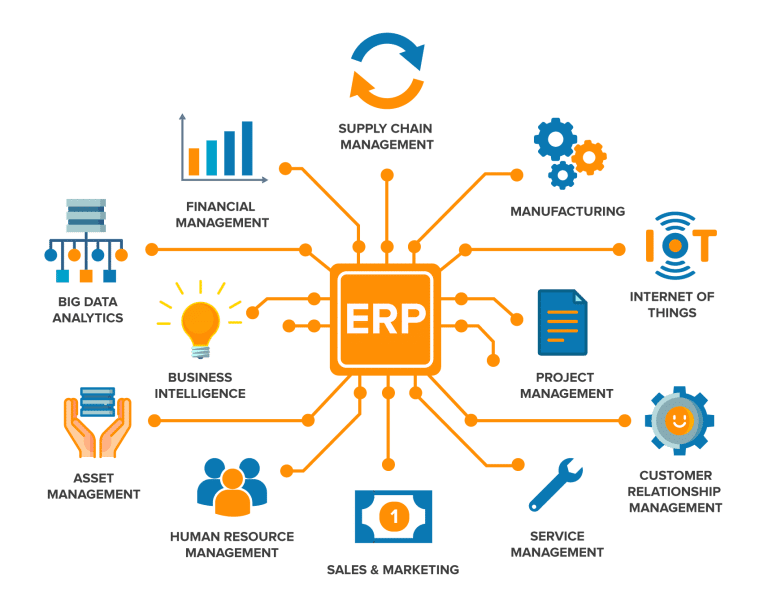

Is ERP Software the Secret Ingredient to Success in the Modern Food Industry?
- trienkhaiweb
- 9 December, 2024
- 0 Comments
In the fast-paced and ever-evolving food industry, staying ahead of the curve is non-negotiable. From shifting consumer preferences to stringent regulations, food businesses face a unique set of challenges that demand innovative solutions. One such solution that has gained traction is Enterprise Resource Planning (ERP) software. But is implementing ERP truly necessary for food businesses, especially in the wake of recent global disruptions?
Quinn Vietnam Manpower, a leading provider of human resources solutions, recognizes the pivotal role technology plays in modern business. With a deep understanding of the food industry’s unique workforce needs, Quinn Vietnam Manpower can help businesses not only implement ERP but also source the skilled manpower required to maximize its benefits.
The Food Industry: A Recipe for Complexity
The food industry is a vital pillar of the global economy, responsible for nourishing populations and driving economic growth. However, this industry operates within a landscape of inherent complexities:
- Unpredictable Demand: Consumer tastes fluctuate, food trends come and go, and unforeseen events (like the recent pandemic) can trigger dramatic shifts in demand.
- Seasonality: Many food businesses grapple with seasonal variations in ingredient availability and consumer preferences.
- Perishability: Food products have limited shelf lives, necessitating meticulous inventory management and supply chain coordination.
- Stringent Regulations: Food safety standards are paramount, and businesses must adhere to a labyrinth of regulations to ensure consumer health.
- Supply Chain Vulnerabilities: The COVID-19 pandemic exposed vulnerabilities in global supply chains, impacting the food industry significantly.

What is ERP, and What Does It Bring to the Table?
Enterprise Resource Planning (ERP) is a comprehensive software system that integrates various business processes into a unified platform. Think of it as the central nervous system of your company, connecting functions like finance, human resources, production, inventory, and sales. ERP systems provide real-time visibility into every facet of your operation, empowering data-driven decision-making.
Why ERP is the Essential Ingredient for Food Businesses
-
Optimized Inventory Management: ERP systems give you a bird’s-eye view of your inventory, tracking stock levels, expiration dates, and demand patterns. This prevents stockouts, reduces waste, and ensures you have the right products on hand when customers want them.
-
Efficient Production Planning and Scheduling: With ERP, you can plan production schedules with precision, considering factors like ingredient availability, labor capacity, and customer orders. This minimizes downtime, maximizes resource utilization, and keeps production running smoothly.
-
Rigorous Quality Control and Compliance: ERP systems help food businesses maintain impeccable quality standards and comply with ever-changing regulations. Traceability features enable you to track ingredients from farm to fork, ensuring product safety and minimizing the risk of recalls.
-
Streamlined Supply Chain Management: ERP integrates data from suppliers, distributors, and retailers, providing end-to-end visibility into your supply chain. This optimizes logistics, reduces lead times, and helps you anticipate and mitigate disruptions.
-
Data-Driven Insights: ERP systems generate a wealth of data that, when analyzed, can reveal valuable insights. You can identify trends, spot inefficiencies, and make informed decisions to improve profitability and competitiveness.
The Pandemic’s Impact: A Catalyst for Change
The COVID-19 pandemic amplified the challenges faced by the food industry. Lockdowns disrupted supply chains, labor shortages emerged, and consumer behavior shifted dramatically. In this tumultuous environment, ERP systems proved to be a lifeline for many businesses. They facilitated remote work, enabled agile adaptation to changing circumstances, and provided the data needed to navigate uncertainty.

Overcoming the Challenges of ERP Implementation
Implementing ERP is not without its hurdles. Integrating with existing systems, managing vast amounts of data, training employees, and managing costs can be daunting. However, with careful planning and the right support, these challenges can be surmounted.
This is where Quinn Vietnam Manpower steps in. We not only provide the skilled manpower needed for successful ERP implementation but also offer expertise in change management and training, ensuring a seamless transition and maximum ROI.
Conclusion
In conclusion, ERP software is not merely a luxury for food businesses; it’s a strategic imperative. It empowers businesses to tackle the industry’s inherent challenges, adapt to unforeseen disruptions, and seize new opportunities. With the right ERP system in place, and the right team to implement and manage it, food businesses can thrive in an increasingly complex and competitive landscape.
Related articles
Employee Empowerment with Quinn Vietnam Manpower
In today’s dynamic business landscape, organizations are increasingly recognizing the importance of employee empowerment as a key driver of success. Quinn Vietnam Manpower, a leading provider of manpower solutions in Vietnam, understands that empowered employees are more engaged, productive, and committed to organizational goals. This article delves into the concept of employee empowerment, exploring its…
Quinn Vietnam Manpower’s 5 Steps to Successful Coaching in 2025
In today’s dynamic business environment, maximizing your manpower’s potential is crucial for success. Effective coaching programs are key to unlocking this potential, fostering employee growth, and driving organizational performance. Quinn Vietnam Manpower, a leading provider of manpower solutions, presents a comprehensive guide to successful coaching in 2025. Whether you’re leading coaching sessions yourself or partnering…
Functional Skills: A Guide for Quinn Vietnam Manpower’s Workforce in 2025
In today’s competitive job market, possessing strong functional skills is more critical than ever. For Quinn Vietnam Manpower, equipping our manpower resources with these essential skills is key to their success and the success of our partner businesses. This comprehensive guide explores the importance of functional skills, particularly in Math and English, and how Quinn…
Level Up Your Workforce: Gamification Strategies for Quinn Vietnam Manpower
In the competitive landscape of Vietnam’s manpower industry, attracting, engaging, and retaining top talent is more critical than ever. Quinn Vietnam Manpower recognizes the power of innovative solutions, and gamification is emerging as a game-changer in the realm of human resources. By integrating game mechanics and elements into various HR processes, Quinn Vietnam Manpower can…
3 Communication Skills Every Manager Needs to Thrive
In today’s rapidly evolving business landscape, effective communication skills are more critical than ever for managers. Whether you’re a seasoned leader or newly promoted, honing your communication abilities can significantly impact your team’s performance, morale, and overall success. This article delves into three essential communication skills every manager needs to master in 2025 and highlights…
Harnessing the Power of Insights with Quinn Vietnam Manpower
In the dynamic landscape of 2025, where businesses face unprecedented challenges and opportunities, the ability to gain profound insights is more critical than ever. For project management (PM) in Vietnam, this rings especially true. Quinn Vietnam Manpower, a leading provider of manpower solutions, recognizes the crucial role of insights in driving project effectiveness and organizational…







